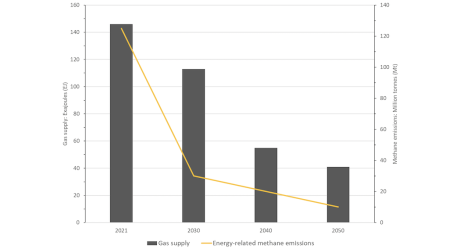GLOBAL INDUSTRY
The science says we need to keep fossil fuels in the ground to meet climate goals. We’re pushing back against industry spin saying otherwise.
OVERVIEW OF WORK
The oil and gas industry is on a public relations campaign to convince investors, financial regulators, and the public at large that they deserve continued support as “part of the solution” to the energy transition. Oil Change is working to challenge these narratives and provide analysis to the financial sector, movement allies, and other decision makers to support a shift away from fossil fuel finance. Further, we are working to reform international energy scenarios that currently guide investment decisions towards failure in meeting the Paris Agreement climate goals and, concurrently, are used by the oil and gas industry to justify dangerous expansion plans.
Following years of campaigning and pressure by Oil Change and others, in 2021, the International Energy Agency (IEA) released its first ever fully fledged energy scenario aligned with limiting global warming to 1.5ºC. Critically, the IEA concluded that: “There is no need for investment in new fossil fuel supply in our net zero pathway,” and, therefore, “there are no new oil and gas fields approved for development in our pathway.” We are using the IEA’s conclusion that 1.5ºC alignment means no new oil and gas fields to hold governments, companies, banks, and investors accountable to backing up ‘net zero’ commitments with an end to new oil and gas finance.
LATEST PROGRAM POSTS
Barely is the ink dry on the IEA’s report which called for no new oil and gas development, and yet today, the UK Government gave the go-ahead to the huge Rosebank oil field, which is seen as the UK’s last untapped oil field.
It is clearer than ever that the climate crisis requires a rapid and managed phase-out of fossil fuel production. Reducing the wasteful practice of emitting methane into the atmosphere does not give the gas industry a pass. They need to clean up and wind down. And they need to start now.
"Prime Minister Kishida is using Japan’s G7 presidency to benefit Japanese corporate interests over the health and security of people and our planet," said Susanne Wong.
Today, ahead of the G7 Climate, Energy and Environment Ministerial meeting this weekend in Japan, the International Energy Agency (IEA)released analyses to inform the G7 energy agenda, including on the outlook for fossil gas.
LATEST PROGRAM RESEARCH
Despite an array of new ‘net zero’ pledges released in the past two years, the climate promises of major U.S. and European oil and gas companies still fail to meet the bare minimum for alignment with the Paris Agreement, according to a new study.
This briefing gives financial institutions an overview of the IEA's first 1.5°C-aligned scenario and what it means for oil and gas. We show that the IEA's conclusion about ending new oil and gas field development is not a product of scenario design; it’s the arithmetic of 1.5°C.
The IEA has a crucial opportunity in 2021 to guide the world towards 1.5°C-aligned energy investment. We outline crucial steps the IEA must take to get on track.




